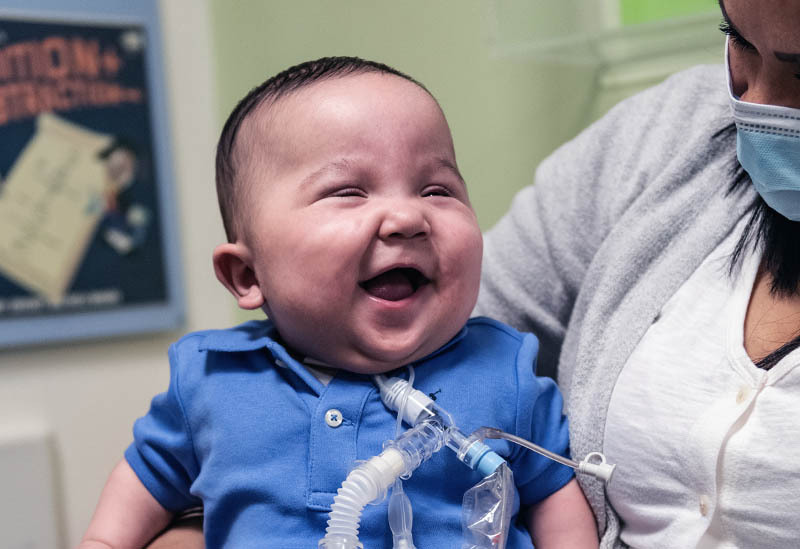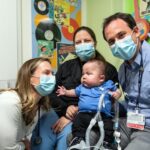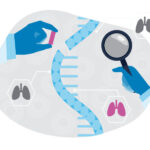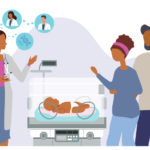Bringing Xavien home: One family’s journey with bronchopulmonary dysplasia

Xavien Velazquez is getting ready to celebrate his first birthday. It’s a milestone for every child but especially meaningful for this little boy who has spent more than half his life away from home receiving care for bronchopulmonary dysplasia (BPD), a chronic lung disease characterized by respiratory distress that is most often seen in newborns who are born early and have underdeveloped lungs. Thanks to the teams in the Divisions of Newborn Medicine and Pulmonary Medicine at Boston Children’s Hospital, Xavien is home, happy, and thriving in time for his big day.
Charting the course after an early arrival
Xavien arrived unexpectedly at 26 weeks and spent the following two months in the neonatal intensive care unit (NICU) at his birth hospital. His parents, Evelyn and Sersy, were by his side every minute of those long days and were dedicated to bringing him home.
“From the moment he was born, he was intubated,” Evelyn recalls of seeing Xavien have an endotracheal tube placed in his airway. The tube was connected to a ventilator which mechanically brought oxygen to Xavien’s lungs to help him breathe. But even with the ventilator support, Xavien’s heart rate and oxygen levels would drop often, and he sometimes needed CPR to recover. After repeated incidents, Evelyn and Sersy knew their son needed more help. The day finally came when they had had enough.
“He had an episode where he completely left us,” Sersy says. “All his levels hit zero for a little bit.” After Xavien was stabilized, the NICU team and his parents agreed that he should move to Boston Children’s, where he could receive the highly specialized care he needed.
Time-defying care
The transfer process from western Massachusetts saw Xavien and his parents arrive at Boston Children’s in the middle of the night. Despite the time, the Newborn Medicine team went straight to work and within hours determined that Xavien’s BPD was complicated by tracheomalacia, a collapse of the large airways.
“Tracheomalacia can be a complication of chronic ventilation support like Xavien had experienced,” says Dr. Jonathan Levin, a physician in Pulmonary Medicine and Newborn Medicine who helps oversee Xavien’s care. “Once we identified tracheomalacia, we were able to adjust his ventilator settings to stop him from having these scary episodes.” The pulmonology team also determined that Xavien was a candidate for tracheopexy to open his collapsing airway. Tracheopexy is a surgical procedure that opens and supports the trachea by securing part of it to the spine.
Evelyn and Sersy were thrilled and relieved to have answers so soon after arriving at Boston Children’s. But getting Xavien to surgery would not be as quick: He would need to reach full-term gestation (40 weeks) before he could undergo the tracheopexy and he was still a month and half from his due date.
“The team told us that we were going to be there with them for a while,” says Sersy.
A customized, long-term approach
Optimizing care for bronchopulmonary dysplasia, infant by infant
When it comes to treating lung disease in the smallest of patients, the Division of Newborn Medicine at Boston Children’s Hospital builds their care around each infant’s unique characteristics and needs. Learn how their customized approach focuses not only on an infant’s lungs today, but also on their long-term growth and development.
What came over the next few months was a careful balance of newborn medicine and breathing support, including a tracheostomy which freed up Xavien’s mouth and face and allowed him to develop his oral-motor skills, participate in physical and occupational therapy, and interact more with his parents.
In January — five months after he was born and two months after his due date — Xavien had his tracheopexy. The procedure successfully opened his airways, and his strong recovery meant that the pulmonary medicine team could start significantly weaning his ventilator settings, with a long-term goal of weaning him off ventilation completely.
No place like home
In March, Evelyn and Sersy brought Xavien home for the first time.
Typically, babies are discharged to a rehabilitation hospital after a tracheopexy, but Xavien’s team was impressed by his recovery and progress and felt that Evelyn and Sersy were equipped to manage his care at home. Their readiness was due in large part to their steadfast commitment to being by Xavien’s side and participating in his care.
“We were allowed to do so much of his care while we were in Boston that almost everything he needed we were already doing,” Sersy says. “Not much of the stuff we’re doing for him at home is new to us.”
At home, Evelyn and Sersy are supported by telehealth and home visits from Xavien’s care team and by the training they received through the Chronic Pulmonary and Ventilator Program.
Today – only weeks away from his first birthday — Xavien enjoys playing, music, and story time, and he lights up the room with his smile.
“He’s just the happiest kid,” Evelyn says. Adds Sersy: “He’s a social butterfly.”
Explore the Division of Newborn Medicine at Boston Children’s.
Related Posts :
-

Inspired research in newborn lung disease: Stella Kourembanas, MD
Stella Kourembanas in the NICU with Julian (photos: Katherine Cohen) During the NICU rotation of her clinical training, Stella Kourembanas, ...
-

Optimizing care for bronchopulmonary dysplasia, infant by infant
Preterm newborns with bronchopulmonary dysplasia (BPD) can require ongoing mechanical ventilation to support their lungs. But babies with BPD aren't ...
-

Cell therapy for lung disease? Proof-of-concept study shows promise
Many serious pulmonary diseases, including genetic lung diseases, lack an effective treatment other than the most extreme: lung transplant. A ...
-

Bringing genomics to community NICUs
About a year and a half ago, Robert Rothstein, MD, FAAP encountered a baby with a pattern of facial features ...





